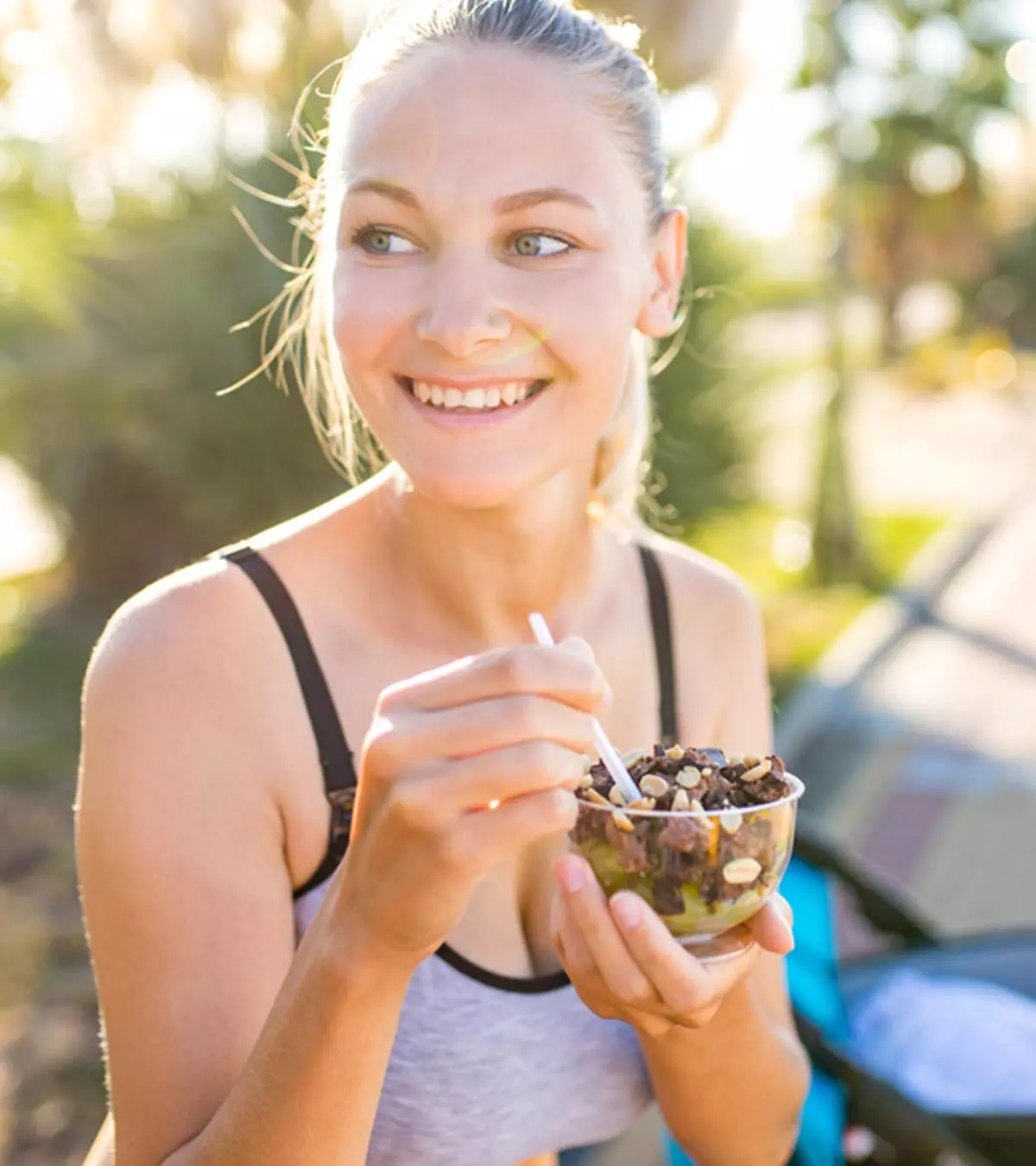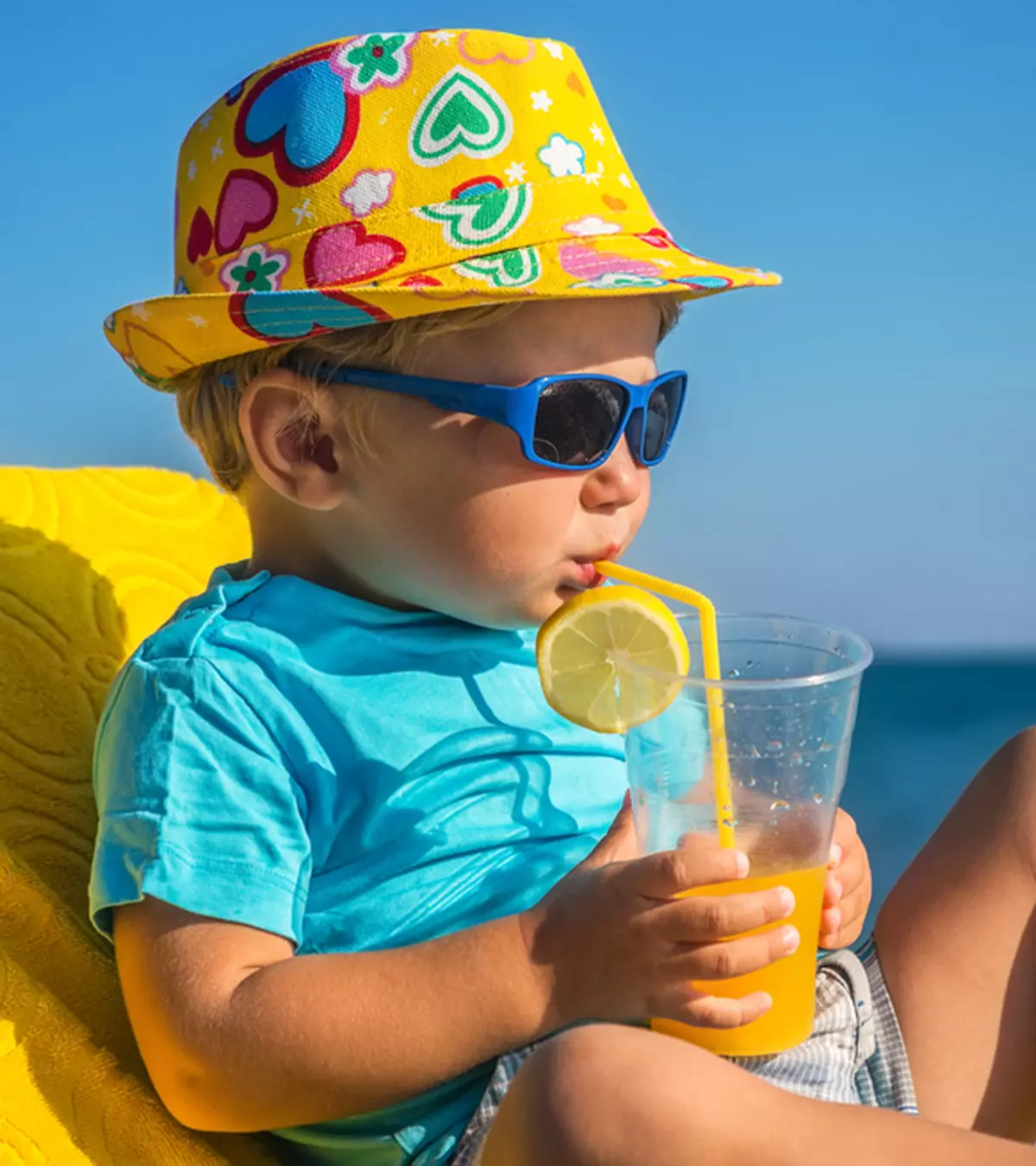
Up until the age of six months, you don’t have to worry much about your child’s diet. The only thing your baby needs at this point is breast milk or baby formula. In fact, it is recommended to not introduce solid food to babies before six months of age and rely solely on mother’s milk for nutrition needs (1). However, once your child crosses the age of six months, you will have to gradually introduce them to other food sources. One area that confuses many new parents is whether to let children have beverages and if yes which ones. With such a wide variety of beverage options available in the market, it’s only natural for parents to feel confused.
It is essential to listen to reliable sources before you go ahead and allow your child to have a particular beverage apart from breast milk and formula. This is why we’ve made it easy for you by listing what babies and kids are allowed to drink, as well as the ones they need to stay away from. Read on to find out:
What’s Allowed?
It would be best if you were careful about what your child drinks, particularly in the initial stages of their life. There are a bunch of things that are allowed and which may be highly beneficial as well. Here’s a list of beverages that you can slowly introduce to your child:
Breast Milk And Baby Formula

Image: Shutterstock
It goes without saying that breast milk is one of the safest options for your child. Up until the age of six months, it is recommended that babies consume breast milk as their only source of nutrition. It is filled with all the necessary fats, carbohydrates, protein, vitamins, and minerals that your child needs, making it the only food source required. You don’t need anything else (2).
However, in some cases, breast milk may not be available for the child. This can happen if mothers have problems with lactating or if the baby has issues with latching. When this happens, the best substitute is baby formula. Baby formula, just like breast milk, contains all the necessary ingredients to support the growth and development of your child, such as protein, carbohydrates, fats, minerals, and vitamins ( 3).
It’s essential to stick to only baby formula or breast milk until the age of six months, and keep in mind that post six months of age until one year, everything else is only “complementary food”. This essentially means that the primary source of nutrition is still breast milk or baby formula, and everything else is just an add-on ( 3).
Water
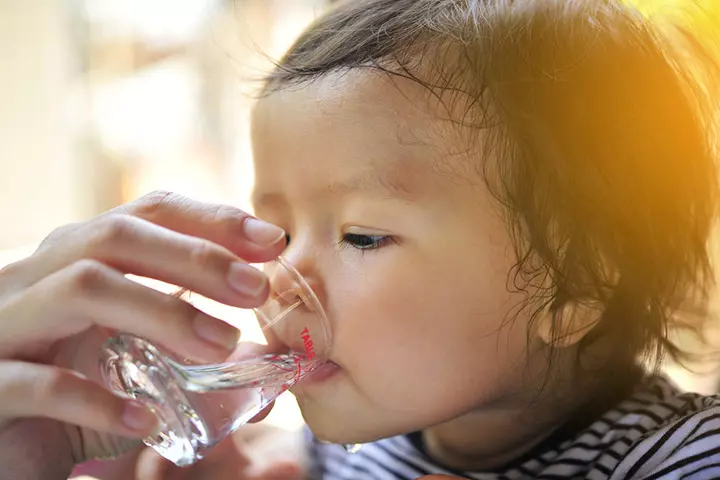
Image: Shutterstock
Not many people know this, but it is recommended that you introduce your little one to water only after the age of six months. Breast milk takes good care of the hydration needs of a baby. Until the age of six months, breast milk or formula is sufficient to replace water for the hydration needs of the body. Water adds no value as such in babies and can also cause issues in some cases. Post-six months of age, you can start giving your baby small amounts of water, maybe in a sippy cup ( 4), (5). Make sure that the water source is of good quality. If you are feeding tap water to your baby, first get the water tested to ensure that it doesn’t contain excess levels of chemicals which might affect the health of the baby.
Coconut Water
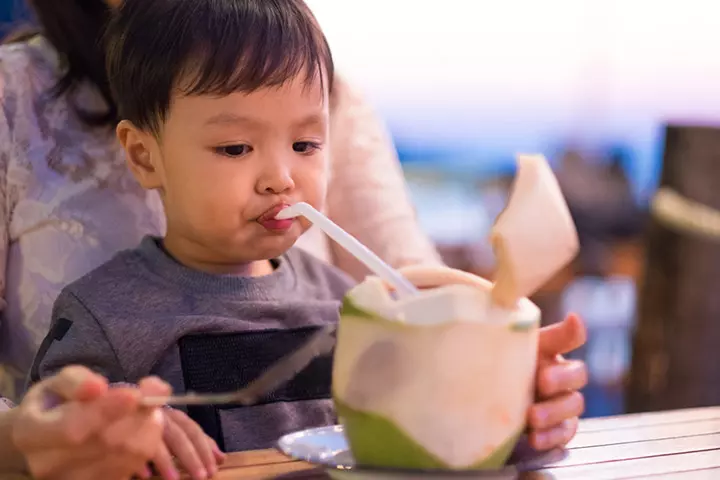
Image: Shutterstock
Babies above six months of age and toddlers can enjoy occasional glasses of coconut water. In fact, it is one of the healthiest beverages you’ll find. It’s sweet, refreshing, natural, and filled with nutrients. Natural coconut water has a significant amount of Vitamin C, potassium, and magnesium. In addition to this, it also works as an electrolyte. It’s important to pay attention to where you source your coconut water from. Freshly obtained ones are the best. The packed and processed ones may have preservatives or added artificial sugars, which you should avoid for your child (6).
Flavored Water
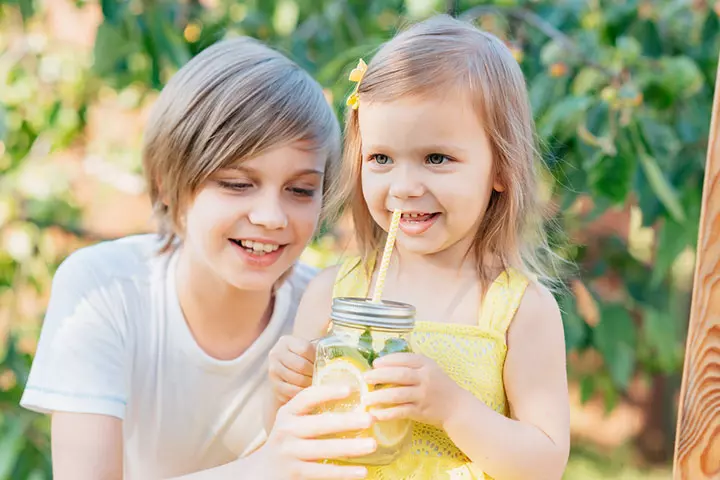
Image: Shutterstock
Most babies and kids have an affinity for sweet beverages and foods. The downside about this is that sugary drinks can be harmful to children. You can give your child flavored water that you make at home from natural ingredients. You can infuse water with fruits such as pineapple, strawberries, or oranges (7). Other infusions like lemons, cucumber, mint can also create unique tastes that your little one might take a fancy to.
What’s Not Allowed?

Image: Shutterstock
Now that you know what is allowed, you also need to know about the beverages that are a strict “no”.
Sweetened Beverages And Sodas
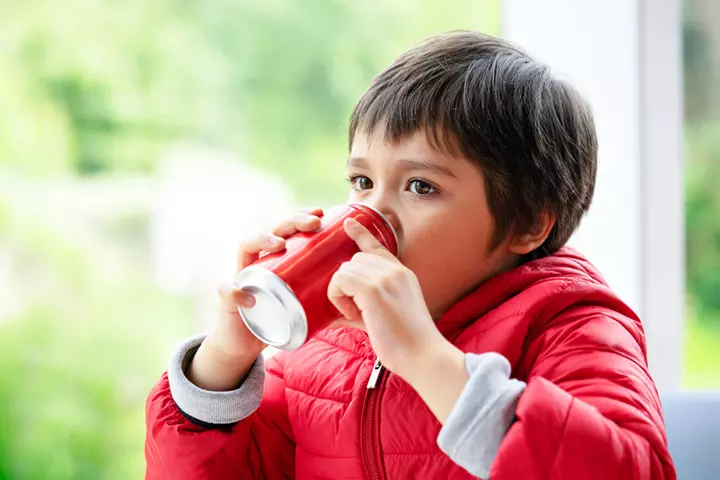
Image: Shutterstock
Sodas are not allowed in a baby or kid’s diet plan. Additionally, sweet beverages such as fizzy drinks, colas, bubble teas, and sports drinks should be avoided at all costs. The high sugar content in all these drinks can ruin your child’s health. One serving of a soft drink that you give your child may contain close to ten teaspoons of sugar — that’s a considerable amount! Several diseases are associated with excessive sugar consumption in children, some of which include nonalcoholic fatty liver disease, gum problems, tooth decay, and type 2 diabetes. Unnecessary weight gain is another side effect of sweetened beverages (8), (9).
Packed And Processed Juices
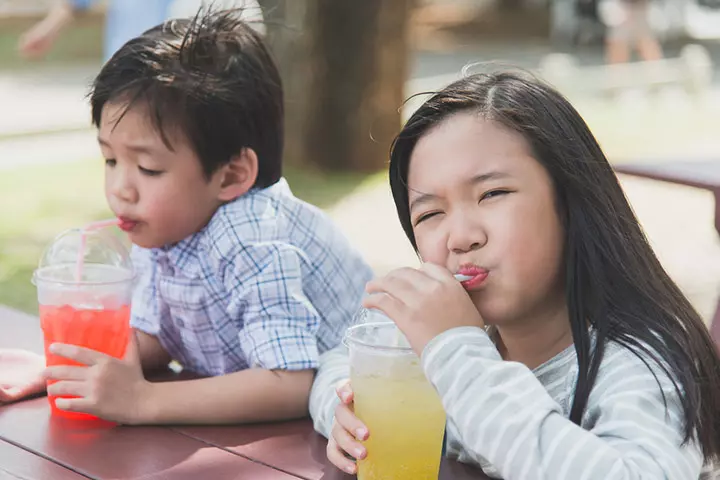
Image: Shutterstock
Many fruit juices are sold under the guise of “hundred percent fresh and natural”, but you’ll have to keep them away from your kid. A lot of fruit juices do contain essential nutrients and vitamins, but you can get them from natural sources like fruits and vegetables. You don’t need processed fruit juices for this. Also, packed and processed fruit juices have preservatives and artificial flavors or sweeteners, which are also not great for health (10).
You could give your child these beverages occasionally and in limited amounts, but don’t make a habit of it!
Beverages That Contain Caffeine
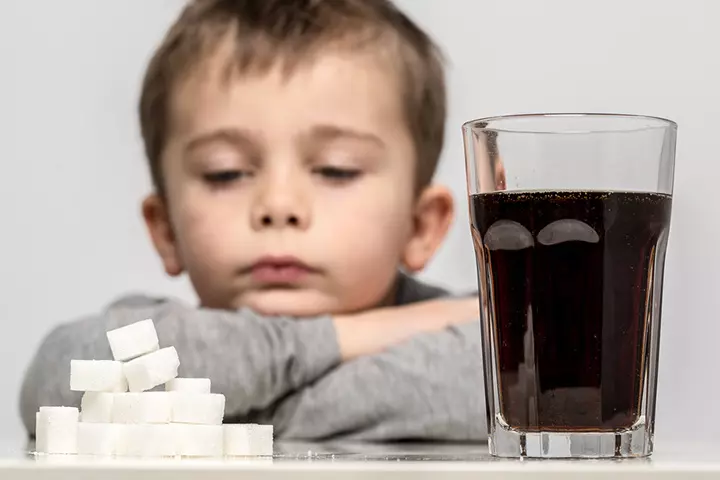
Image: Shutterstock
Coffee is not the only thing that contains caffeine. Sodas, energy drinks, and teas also contain significant caffeine, which can have an adverse effect on your child’s health. It can cause anxiety, sleep disorders, heart issues, high blood pressure, increased heart rate, and jitteriness. In fact, caffeine shouldn’t be given to children below the age of twelve (11).
Now that we have a better understanding of what beverages to give our children and which ones to avoid, we would be able to plan better. As seen above, it’s better to avoid beverages that contain soda and high levels of sugar. Also, the presence of preservatives may not be best for your little one. It would also be a good idea to consult your pediatrician in deciding which beverages to allow for your child. What are your thoughts on this? Let us know in the comments below!
References
- Breastfeeding
https://www.who.int/health-topics/breastfeeding#tab=tab_2 - Breastfeeding
https://www.cdc.gov/nutrition/infantandtoddlernutrition/breastfeeding/index.html - Review of Infant Feeding: Key Features of Breast Milk and Infant Formula
https://www.ncbi.nlm.nih.gov/pmc/articles/PMC4882692/ - No need for water supplementation for exclusively breast-fed infants under hot and arid conditions
https://pubmed.ncbi.nlm.nih.gov/2091363/ - Foods and Drinks to Encourage
https://www.cdc.gov/nutrition/InfantandToddlerNutrition/foods-and-drinks/foods-and-drinks-to-encourage.html - Use of coconut water (Cocus nucifera L) for the development of a symbiotic functional drink
https://www.ncbi.nlm.nih.gov/pmc/articles/PMC7110305/ - Water, Hydration and Health
https://www.ncbi.nlm.nih.gov/pmc/articles/PMC2908954/ - Soft drinks consumption and nonalcoholic fatty liver disease
https://www.ncbi.nlm.nih.gov/pmc/articles/PMC2880768/ - The association between sugar-sweetened beverages and dental caries among third-grade students in Georgia
https://pubmed.ncbi.nlm.nih.gov/26339945/ - Satisfying America’s Fruit Gap: Summary of an Expert Roundtable on the Role of 100% Fruit Juice
https://pubmed.ncbi.nlm.nih.gov/28585690/ - Caffeine Use in Children: What we know, what we have left to learn, and why we should worry
https://www.ncbi.nlm.nih.gov/pmc/articles/PMC2699625/
Community Experiences
Join the conversation and become a part of our nurturing community! Share your stories, experiences, and insights to connect with fellow parents.











